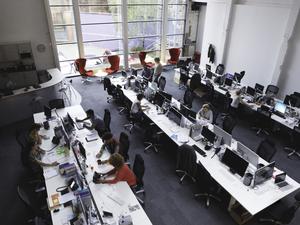
The U.S. tech sector has remained in hiring mode this year, according to the latest data from IT trade association CompTIA. But even amid a red-hot job market, many in the tech industry are worried the good times may be coming to an end.
CompTIA found national postings for tech jobs surpassed 443,000 in April and 1.6 million year-to-date. That’s an increase of 40% over the same period last year.
The Baltimore metro area saw 19,369 tech job postings from Jan. 1 to April 30, compared to 15,521 in 2021. The 25% increase from last year's tech job posting numbers is higher than some other post-industrial cities such as Pittsburgh (19%) and Columbus (17%), but slower than cities such as Detroit (55%) or Cleveland (45%). The state of Maryland as a whole saw a 43% increase in tech job postings, with 35,841 job postings since Jan. 1 of 2022, compared to 25,136 in 2021.
"The number of funded startups in Baltimore was up by 35%, so to see an increase in job postings by 25% seems completely consistent with the growth of the startup economy in Baltimore," said Jamie McDonald, CEO of UpSurge Baltimore, an organization that aims to make the city a national hub for inclusive equitable innovation.
A broader array of startups, outside of the medical and cybersecurity companies that often come out of Baltimore, have been receiving funding, McDonald said. The trend of remote work, which enables employees to live outside of cities that are often traditional tech hubs, is also seen by some in the industry as a benefit to Baltimore, as tech workers may be attracted to the area's lower cost of living.
"You can have a New York City employer, but you can live in Baltimore, where your cost of living is much less," said Anirban Basu, CEO of Sage Policy Group, during Baltimore Homecoming in May.
High profile startups in Baltimore have also helped increase the national prestige of the tech industry, McDonald said.
NASDAQ CEO Adena Friedman echoed that sentiment during a Baltimore Homecoming event, saying she thinks Baltimore could be "the entrepreneurial hub of the East Coast."
Baltimore has several strong assets — such as higher educational institutions, proximity to other major cities like New York City and Washington D.C., strong local arts and cultural institutions, and affordable housing stock — that put it in a good position to continue growing as an entrepreneurship hub, Friedman said.
Top metros for tech job postings
The five markets with the most tech job postings in 2022 each saw at least a 32% increase in tech job postings compared to the same period in 2021.
The New York City metro area saw the most tech job postings of any city since Jan. 1 with more than 91,000 listings, followed by Washington, D.C. (78,001), Dallas (73,736), Los Angeles (68,653) and Chicago (56,346).
In April alone, those five metro areas each surpassed 15,000 tech job postings. Jobs for software developers and engineers accounted for nearly 30% of all tech job postings in April, according to the report.
On a percentage-growth basis, Bremerton-Silverdale, Washington (270% growth); Topeka, Kansas (221%); Dover, Delaware (177%); and Little Rock, Arkansas (167%); led the way.
Among metros with an increase of at least 5,000 postings, Boise, Idaho (158%), led the way, followed by Kansas City, Kansas and Missouri (75%) and St. Louis (65%).
Which states have the most tech job openings?
Among states, California is tops for tech job postings year-to-date, with 215,000 postings in 2022.
Texas was the only other state with at least 100,000 tech job listings, posting 153,795 jobs so far this year. Florida (79,571), Virginia (70,895) and Illinois (69,657) followed.
A handful of states saw more than 100% year-over-year growth in tech job postings since January, including Kansas, Nevada, Oklahoma, Idaho, Arkansas, Rhode Island, Mississippi and Vermont, which saw the biggest percent increase at 221%.
Potential slowdown looms for tech jobs
The promising job posting numbers come as the country overall added more jobs than expected last month. But even amid a hot labor market, many in the tech industry are preparing for a slowdown. Or at least an end to the record growth the industry has experienced over the last decade.
Some of the biggest tech firms in the U.S. have indicated their hiring pace will decrease. Meta (NYSE: B), the parent company of Facebook, said this month it’s implementing a hiring freeze, which Business Insider described as unprecedented. The decision comes amid missed revenue targets, and Facebook global head of recruiting said in a memo the engineering team would be first to be impacted by the freeze.
Uber, Amazon among tech giants treading carefully on hiring
Uber (NYSE: UBER), meanwhile, told employees it would “treat hiring as a privilege and be deliberate about when and where we add headcount,” according to CNBC. Tech giant Amazon (Nasdaq: AMZN) is also pumping the breaks, with its CFO telling analysts in a recent earnings call that Amazon's warehouses are now “overstaffed.” Additionally, layoffs have also hit Netflix, which cut about 150 jobs in May, mostly impacting its U.S. workforce.
Venture backed tech firms, which often mirror the results of the public tech market, are also feeling the burn. Cameo, a Chicago startup that lets users order video messages from celebrities, cut more than 80 employees, a quarter of its workforce. Robinhood, an online stock trading platform, cut 9% of its workforce this month. And Reef, a Miami ghost kitchen startup, laid off 700 people in May as a result of the “current state of the economy.”
Prominent startup investors are also bracing for slowdown. Silicon Valley VC Bill Gurley tweeted that an "entire generation of entrepreneurs [and] tech investors built their entire perspectives on valuation during the second half of a 13-year amazing bull market run. The 'unlearning' process could be painful, surprising, [and] unsettling to many. I anticipate denial."
Investor David Sacks, who leads Craft Ventures, said markets are experiencing the "worst downturn since the dot-com crash."
And perhaps another sign of things to come, Y Combinator, a top Silicon Valley startup accelerator, told its startups to “plan for the worst.”
“The safe move is to plan for the worst,” the memo reads. “If the current situation is as bad as the last two economic downturns, the best way to prepare is to cut costs and extend your runway within the next 30 days.”










